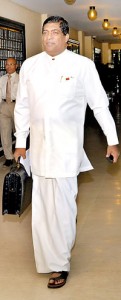News
Budget’s indirect taxes worry public
Critics have hit back at Finance Minister Ravi Karunanayake claimed “purse-friendly” Budget this week, saying it contained many indirect taxes, the effects of which would gradually come to roost.
There is concern that some measures, including proposed controls on commodity prices, were not practical.
Defending the Budget, Mr. Karunanayake said the government had to take certain measures to increase revenue while giving consideration to the greater good.
“The scrapping of vehicle permits is one of these proposals. It benefited only a few but we were losing billions of rupees,” he said (see separate story).
The scrapped permit system had been costing the government revenue losses of Rs. 40 billion, he said.
Criticising the Budget, Colombo University economics lecturer Dr. Priyanga Dunusinghe said the benefits to the middle class were lower than expected while low-income groups received no benefits.
People on high salaries of Rs 200,000 a month had been given relief with the rise in the personal income tax threshold but the middle class had been hit by the increase in the Nation Building Tax (NBT) and Value Added Tax (VAT).
“The import tax on vehicles has been increased – it is not a luxury to have a vehicle in a developing country. The new emission tax of Rs. 5000 is an indirect road tax. Public servants enjoyed car permits and this concession has been withdrawn,” Dr. Dunusinghe said.
“The government must be lacking assurances from foreign donors about aid and the whole Budget is aimed at obtaining funds through local taxes,” he remarked.
Private sector employees who expected a salary increase of Rs. 2,500 have been cheated in the Budget and public sector employees had been taken for a ride, being promised a wage rise of Rs. 10,000 which had so far not been delivered, a Janatha Vimukthi Peramuna spokesman charged.
“Now the new government is attempting to lay hands on the EPF/ETF pension fund of the working class,” North Central Provincial council member and President of the JVP -affiliated Intercompany Employees Federation, Wasantha Samarasinghe said.
“We see the NBT and the VAT has been increased and our calculations show each person will face Rs. 1250 more in taxes in 2016,” he said, adding that families would each face Rs. 5,000 in direct and indirect taxes.
“This Budget put salmon and sprats in the limelight but cheated the public indirectly,” he said. Vehicle importers are concerned that price increases from the Budget would affect sales.
Small and Medium Vehicle Importers Association of Sri Lanka head Asanka Atapattu said taxes such as the VAT, NBT, vehicle emission test increase, insurance increase and the tax on vehicle entitlement certificate would send up vehicle prices.
Due to the increase of the vehicle prices, the imports and, consequently, purchases would drop, affecting a large number of people who depend on the industry for their livelihood, he said.
He said people who had vehicles on order would now have to pay much more than the estimated price for them.
Colombo Traders’ Association President Yusuf Mohammed Ibrahim said maintaining controlled prices on imported food items would be difficult due to the fluctuating dollar value against the rupee.
He said importers had requested a grace period to sell stocks imported before the Budget’s introduction of government price controls.
The government can impose controlled prices over local products but not over imported products, pointed out importer and rice miller M.S.M. Zaneer, who brings in sprats, coriander, dhal, chickpeas, split yellow peas and tinned and dried fish.
“The dollar rate on the day of the Budget was Rs. 142 per dollar but increased by Rs 1.50 during the week. This changes the prices of every product,” he said.
He imports sprats at Rs. 393,250 a ton, with the per-kilo price about Rs. 425 but the Budget-controlled price is Rs. 410, he said. He had had to import tinned fish at Rs. 135 a tin but the new price fixed in the Budget was Rs. 125 per 425g tin.
“The Budget is good overall but not good for importers. The rice prices are perfect for both consumer and seller but imported items cannot be controlled,” Mr. Zaneer said.
Minister’s response to criticism of ‘futuristic’ Budget  Ravi Karunanayake on Budget Day Finance Minister Ravi Karunanayake declared that the first Budget presented by the United National Party-led government was “very futuristic and investor and consumer-friendly”. Defending his Budget against criticism by the Opposition and trade unions, he made the following points: Increases in VAT and NBT: Vehicle Tax: Higher vehicle emission test charge: Withdrawal of vehicle permits to public sector employees: New voucher system to buy fertiliser: Foreign currency liberalisation: Job creation: |

